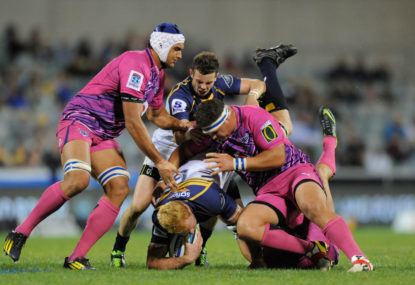Naas Botha once said the Currie Cup is not won in May and I suppose we could say the Super Rugby is not won in February either, however when you start looking around it is clear the South African Franchises are not in a good head space at the moment.
Sharks
They are currently the clear front runner in the South African conference, not only by results but the manner in which they dispatched the Bulls and took care of the Hurricanes in Round 2.
The Sharks scored four tries in the opening round, the first a well-executed try featuring Pat Lambie offloading to Lwazi Mvovo in space, and then ultimately Paul Jordaan for the finish in the corner. The second try came from pressure in the lineout and an intercept by Cobus Reinach for the easy run in.
The third try came from a clever Frans Steyn cross-kick into the hands of Akona Ndungane, who finished off in the corner.
Their fourth try came from a long period of pressure in the final minutes of the match when Lambie dummied to his outside and crashed over from five metres.
Against the Hurricanes the Sharks scored their first try from a close-in drive by Willem Alberts after a few phases of pressure on the Hurricane line, and their second from a well anticipated intercept by Mvovo.
Bulls
It took them 72 minutes before they managed to score a try from a well-executed maul against the Sharks.
Against the Cheetahs the Bulls went tryless.
Against the Lions, the familiar Bulls game of kick and chase, maul and drive worked, their first try coming from within their half when Jan Serfontein recognised the opportunity to attack, drew his man and passed outside to JJ Engelbecht who fed Bjorn Basson. He made the run down the line and, after drawing the final defender, passed inside to Jan Serfontein, who finished.
Cheetahs
The Cheetahs started their campaign full of promise against an unrated Lions outfit, their first try courtesy of a Willie le Roux counter from inside his half, then passing to a sprinting Raymond Rhule to finish the try.
A second try was in the offing when Willie le Roux again saw the space out wide and gave a long pass to Cornell Hendricks to score in the corner.
Against the Bulls the Cheetahs went tryless.
The Cheetahs scored their first try against the resurgent Rebels from a maul, their second again from a maul.
Lions
For all their endeavour thus far in their first three outings the Lions have created one try with attacking play, a line break by Warren Whitely in the midfield with a flat pass to Stefan Watermeyer on the outside and running the ball close to the uprights for the score.
The Lions managed two tries against the Bulls, both from charge downs.
Stormers
Against the Lions, Scarra Ntebeni was the only try scorer from a collapsed maul when he rolled around (with some suspect obstruction by Rohan Kitshoff) and dotted down.
On a wet Newlands, the Stormers needed all of 80 minutes to score a try from a maul to take the game by one point against the Hurricanes.
It is disconcerting when you can fill up the try scoring exploits of five Super rugby franchises in just one page after three rounds. What is even more disconcerting is the manner in which these tries have been scored.
After the first three rounds, the Sharks have a try for and against of 6-1 after two matches, the Bulls 2-6 after three matches, the Cheetahs 4-5 after three matches, the Lions 3-4 after three matches and the Stormers 2-4 after two matches.
It seems the go-to guide of South African rugby is the maul; if all else fails, go for the corner, set up a maul and grind your way to the tryline.
The Bulls have not changed their manner of play at all since 2007, the Stormers are as innovative as toast, the Lions are willing but simply won’t last the season and the Cheetahs are yet to come down to earth and focus on their structures.
At least one of these four teams need to get it together.
Rugby matches are mostly won by scoring tries, only the odd match will results in favour of a team being outscored, and it stands to reason no team can defend for 80 minutes.
The big issue here is the coaches. Neither Frans Ludeke nor Allistair Coetzee have altered their game plan in any way since 2008, yet rugby is a living entity that forever evolves, be it the laws that force you to change tactics or opponents finding ways to nullify your game plan.
It is no longer about physical prowess – everyone spends time in the gym these days, we all have sport scientists ensuring athletes perform at their optimum, but the few inches of space between your ears coupled with sublimely-coached skills will set the winners apart from the losers.
Of course, a little bit of vision won’t hurt either.





























































































